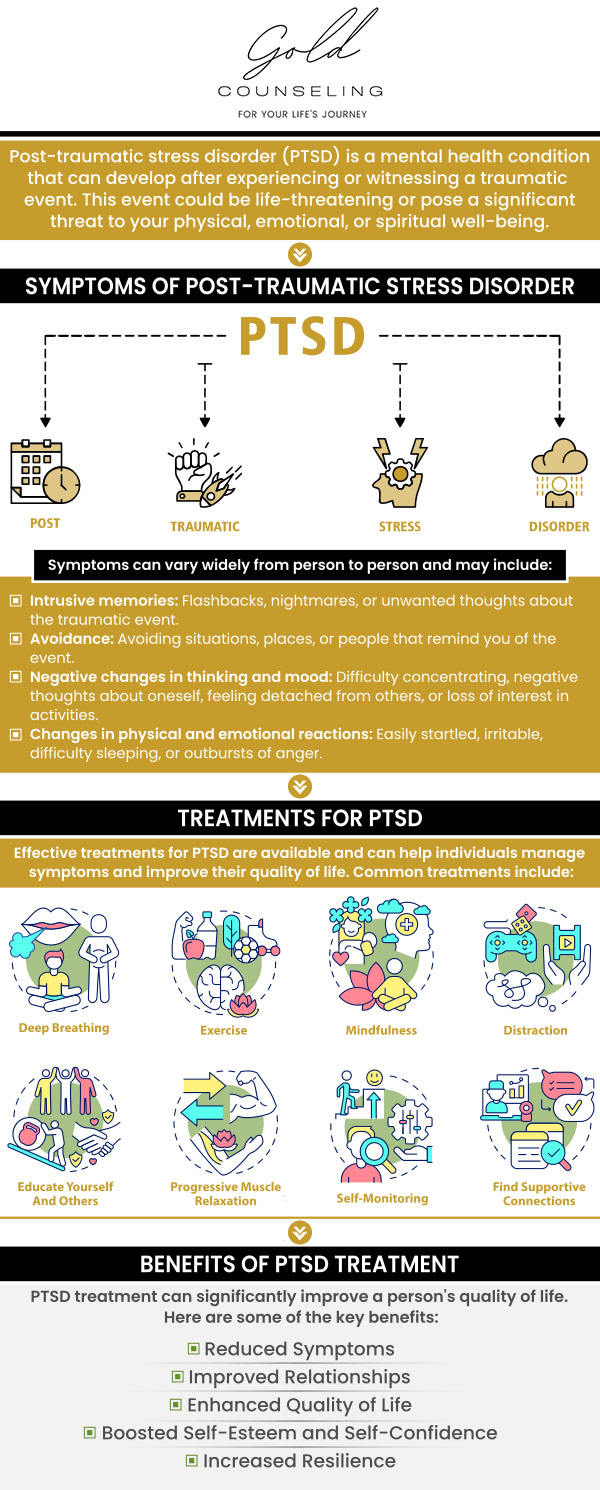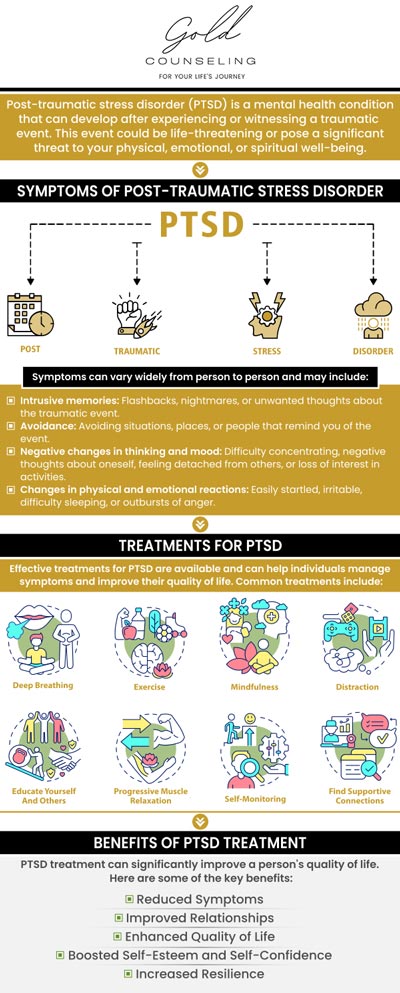Post-traumatic Stress Disorder (PTSD) Therapist Q&A
If you or a loved one has post-traumatic stress disorder, it’s incredibly important to seek help from a mental health professional. Getting the support you deserve can change your life for the better and lessen your symptoms. For more information, contact us or book an appointment online. We have convenient locations to serve you in Riverdale, Kaysville, Draper, and St. George, UT.




Table of Contents:
What is PTSD?
What are the symptoms of PTSD?
How common is PTSD?
What are the causes of PTSD?
The professional team of therapists at Gold Counseling is dedicated to offering our patients high-quality, personalized mental health care. We treat a long list of mental health issues, including major depressive disorder, anxiety, substance abuse, eating disorders, obsessive-compulsive disorder, schizophrenia, and more. A common psychiatric disorder our clinic provides care for is called post-traumatic stress disorder. For more information on post-traumatic stress disorder specialists, please continue reading down below.
Post-traumatic stress disorder, otherwise known as PTSD, is a psychiatric and anxiety disorder that occurs after a person experiences a traumatic event. PTSD can be characterized by a series of symptoms related to the fight-or-flight response. People with this mental health disorder can be triggered by sounds, people, places, smells, and feelings associated with the traumatic event. There are two different types of this disorder: complex post-traumatic stress disorder and post-traumatic stress disorder. The main difference between these two is that C-PTSD develops after many recurring events that happen over a longer period whereas PTSD develops after one single traumatic event.
There are a few different treatment options for PTSD that may include long-term therapy sessions and medications to help control some of the more severe symptoms. A combination of cognitive behavioral therapy, stress inoculation training, eye movement desensitization and reprocessing, and prolonged exposure therapy can help patients manage their symptoms. Depending on the most prominent symptoms that are affecting your day-to-day life, a mental health therapist or doctor may prescribe you medications such as antidepressants, beta-blockers, anxiety medications, prazosin, or antipsychotics.
People who suffer from PTSD have symptoms that fall under four categories: avoidance symptoms, re-experiencing symptoms, mood-related symptoms, and arousal symptoms.
Avoidance:
• Avoiding places
• Avoiding events
• Avoiding people
• Avoiding feelings
• Avoiding anything related to the event
Re-Experiencing:
• Flashbacks
• Nightmares
• Bad memories
• Panic attacks
Mood:
• Mood swings
• Anger/irritability
• Depression
• Shame/guilt
• Memory issues
• Suicidal thoughts
Arousal:
• Insomnia
• Anger outbursts
• Paranoia
• Anxiety
• Jumpy/easily startled
If you are experiencing any of the above symptoms, make sure you talk with a doctor, therapist, or psychiatrist right away.
Every year about 3.5 percent of American adults struggle with post-traumatic stress disorder. Unfortunately, it affects about 8-10 people at least once in their life. Although it can affect all genders, women are typically more likely to develop post-traumatic stress disorder. It is one of the most common mental health disorders that occurs after severe trauma.
PTSD can develop in anyone who has experienced an event such as war, sexual assault, physical abuse, natural disasters, or any other serious event. Some people are more prone to developing this disorder than others. Risk factors that contribute to the development of post-traumatic stress disorder include:
• Childhood trauma
• Witnessing another person’s death
• Having a preexisting mental health condition
• Having issues with substance abuse
• Having no support system
• Not getting help after the initial event
• Dealing with an additional stressor after the event
If you or a loved one has post-traumatic stress disorder, it’s incredibly important to seek help from a mental health professional. Getting the support you deserve can change your life for the better and lessen your symptoms. The kind staff at Gold Counseling would be more than happy to answer any questions you have about our post-traumatic stress disorder treatments. Our post-traumatic stress disorder specialist can answer any additional questions you may have and support you through your mental health journey. For more information, contact us or book an appointment online. We serve patients from Riverdale UT, Washington Terrace UT, Clinton UT, Kaysville UT, Clearfield UT, Farmington UT, Draper UT, Riverton UT, Sandy UT, St. George UT, Bloomington UT, Santa Clara, UT, and surrounding areas.
Check Out Our 5 Star Reviews



Additional Services You May Need
▸ Relationship Counselling
▸ Couples Counselling
▸ Individual Therapy
▸ EMDR Therapy
▸ Spiritual Healing
▸ Disordered Eating
▸ LGBTQIA+ Therapy
▸ Group Psychotherapy
▸ Life Coaching Therapist
▸ Depression Treatment
▸ Mental Health Clinic
▸ Life Transition Therapy
▸ Telehealth Counseling
▸ Cognitive Behavioral Therapy (CBT)
▸ Dialectic Behavioral Therapy (DBT)


